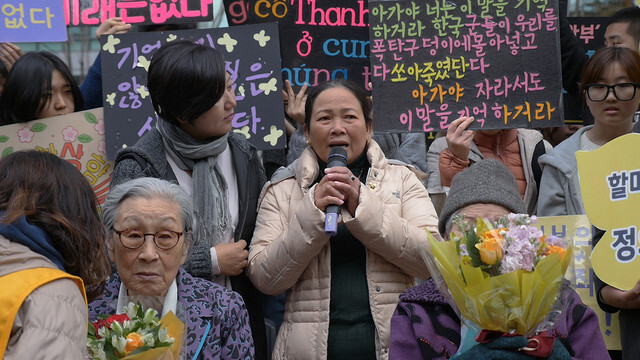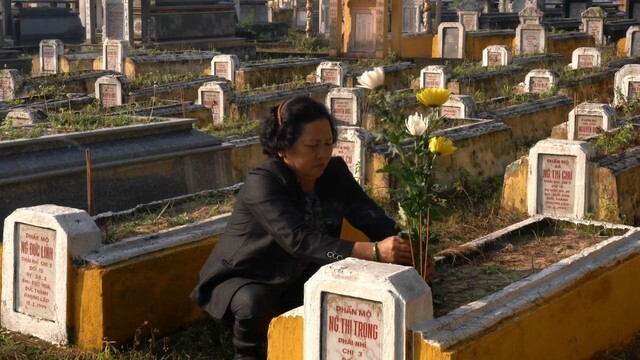hankyoreh
Links to other country sites 다른 나라 사이트 링크
[Interview] Filmmaker makes documentary about Vietnam War civilian massacres

She was a model student, ranked first in her class with multiple plaques and commendations -- yet after her first year of high school, she abruptly dropped out. She wanted to see a bigger world, one that wasn’t taught about in schools. Scraping up her own travel funds, she spent eight months traveling to eight different Asian countries, including India, Nepal, Tibet, and Vietnam. Upon her return, she captured the experience in the short documentary “Roadschooler” (2008) and the book “The Road Is School” (2009).
She told her grandfather that she’d been to Vietnam. Her grandfather, a Vietnam veteran who takes pride in his medal, asked her where she had gone. “I went to Da Nang,” she replied. But the conversation stopped there. The grandfather went silent, as though recalling something. A few years later, he passed away from cancer caused by complications from defoliant exposure in the Vietnam War.
After studying film at the Korean National University of Arts, she made an autobiographical documentary. Born a hearing child to hearing-impaired parents, she had learned sign language before she learned to speak.
“People take pity, but what I’d like to say first of all is that the world I live in is extremely normal and brilliant,” filmmaker Lee-Kil Bo-ra said during an interview in Seoul’s Yeonnam neighborhood on Feb. 14. Her debut feature film “Glittering Hands” was released to acclaim in 2015.

Early the same year as her feature debut, she traveled to Vietnam again. After hearing about the massacres of civilians there by South Korean troops, she took part in a “Vietnam peace journey” in order to find out more information. It was at that time that she first met Nguyen Thi Thanh, a survivor of a civilian massacre that took place in the villages of Phong Nhi and Phong Nhat near Da Nang in 1968.
“Thanh knew I was the granddaughter of a soldier who had fought in the war, yet she told me to have some warm rice before I left. I couldn’t understand how someone could be so generous and conciliatory after experiencing what she had. I found myself thinking, ‘I need to do something for her. I should make a film.’”
A few months later, Nguyen visited South Korea along with another massacre survivor from a different village. The two of them were appearing as witnesses in a “citizens’ peace court.” Lee-Kil followed them with a camera. At Seoul’s Gwanghwamun Square, they saw a tent concerning the Sewol ferry sinking. “What’s that?” they asked. After hearing the explanation, they immediately walked over to the tent and crouched down on their knees in front of the table where signatures were being collected. They looked at each of the names and faces of the Danwon High School students displayed on the cloth hanging from the desk.
“I could see they were doing the same thing here that they did in front of the Vietnam victims’ memorial. I felt like I should learn from their attitude, and I vowed once again to make a film about it.”
Between 2016 and 2018, Lee-Kil visited Vietnam several times to film vivid accounts from massacre survivors. Dinh Cam, who is hearing impaired, shared his memories from the time through gestures.
“I saw it clearly. They were South Korean troops.”
As someone with a command of both spoken language and signing, Lee-Kil had spent her life linking the worlds of the hearing impaired and hearing, and she naturally understood the meaning of Dinh’s gestures. Villagers later marveled to see her understanding his words better than even his own family. Recalling the painful memories of that day, Nguyen said, “I want an apology.”

Meanwhile, South Korean veterans of the Vietnam War continue denying or keeping silent about the truth. Their memories are different from those of the Vietnamese. Lee-Kil’s camera does not portray the veterans as one-dimensional perpetrators of violence; it calmly and simply shows the position they are in.
“I didn’t start out wanting to make a film that decried the brutality of war. Rather than digging into the truth about the massacres, I wanted to ask questions about how we should look at the differing memories of the victims, the veterans, and the South Korean state,” Lee-Kil said. It is for this reason that the film was given the title “A War of Memories” (premiere date Feb. 27).
The production team for the film consisted exclusively of women: a female director, female producer, and female staff. Lee-Kil felt that this was how it should be.
“To date, most public memory has been recorded in the language of men. We needed to approach it this time through non-masculine language and a female perspective. When we were making the film, I had a lot of people asking me, ‘What does a young woman who’s never even been in the military know about war?’ When war happens, the greater damages are suffered by women, disabled people, and children -- why shouldn’t we speak? That’s why I thought it was up to us to capture their stories.”
At the end of the film, Nguyen says, “I’d like it if the veterans came here to hold our hands.” Yet no one has yet offered her a sincere apology.
“They say the matter isn’t so easy to resolve because of all the complex diplomatic issues between South Korea and Vietnam. But I think we should give them what they want. It’s the same for them as it is for the Japanese comfort women survivors, who are more interested in a sincere apology from the Japanese government than any money. I’d like it if the film helps people experience seeing and thinking about things from the victims’ perspective.”
By Suh Jung-min, staff reporter
Please direct comments or questions to [english@hani.co.kr]

Editorial・opinion
![[Column] Season 2 of special prosecutor probe may be coming to Korea soon [Column] Season 2 of special prosecutor probe may be coming to Korea soon](https://flexible.img.hani.co.kr/flexible/normal/500/300/imgdb/original/2024/0426/3317141030699447.jpg) [Column] Season 2 of special prosecutor probe may be coming to Korea soon
[Column] Season 2 of special prosecutor probe may be coming to Korea soon![[Column] Park Geun-hye déjà vu in Yoon Suk-yeol [Column] Park Geun-hye déjà vu in Yoon Suk-yeol](https://flexible.img.hani.co.kr/flexible/normal/500/300/imgdb/original/2024/0424/651713945113788.jpg) [Column] Park Geun-hye déjà vu in Yoon Suk-yeol
[Column] Park Geun-hye déjà vu in Yoon Suk-yeol- [Editorial] New weight of N. Korea’s nuclear threats makes dialogue all the more urgent
- [Guest essay] The real reason Korea’s new right wants to dub Rhee a founding father
- [Column] ‘Choson’: Is it time we start referring to N. Korea in its own terms?
- [Editorial] Japan’s rewriting of history with Korea has gone too far
- [Column] The president’s questionable capacity for dialogue
- [Column] Are chaebol firms just pizza pies for families to divvy up as they please?
- [Column] Has Korea, too, crossed the Rubicon on China?
- [Correspondent’s column] In Japan’s alliance with US, echoes of its past alliances with UK
Most viewed articles
- 1AI is catching up with humans at a ‘shocking’ rate
- 2‘We must say no’: Seoul defense chief on Korean, USFK involvement in hypothetical Taiwan crisis
- 3[Column] Season 2 of special prosecutor probe may be coming to Korea soon
- 4Is Japan about to snatch control of Line messenger from Korea’s Naver?
- 5Up-and-coming Indonesian group StarBe spills what it learned during K-pop training in Seoul
- 6The dream K-drama boyfriend stealing hearts and screens in Japan
- 7Is N. Korea threatening to test nukes in response to possible new US-led sanctions body?
- 8S. Korea “monitoring developments” after report of secret Chinese police station in Seoul
- 9Ferry accident likely due to whale; 1 killed
- 10[Column] ‘Choson’: Is it time we start referring to N. Korea in its own terms?